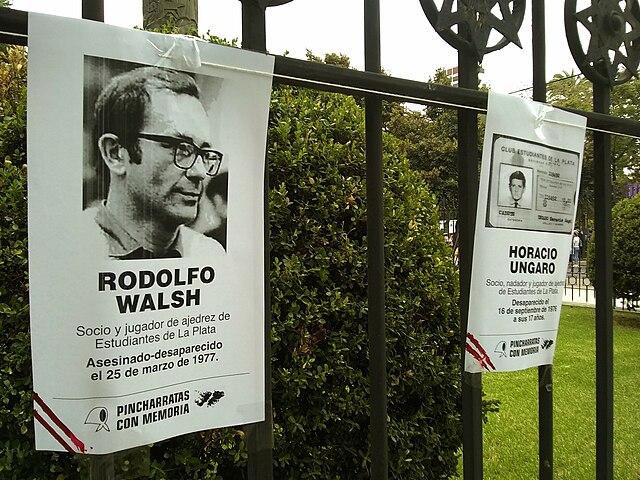Between 1976 and 1983, tens of thousands of people “disappeared” in Argentina. Their absences were designed to create a state of terror that few were strong enough to defy. But who were “the disappeared” and what did they endure?
The majority of the “disappeared” were in their twenties and early thirties, captured and often subject to torture in clandestine detention centers before being killed. Many were members of leftist political organizations—militants and activists—while others were trade unionists, journalists, students, artists, and teachers.
Some were young parents, including pregnant women. Approximately 500 babies were born in captivity, stolen from their imprisoned mothers by the military government and given to adoptive families who raised the children with no knowledge of their biological identity.
The mothers of the “disappeared”—the babies’ grandmothers, the Abuelas de Plaza de Mayo—donned white head scarves and circled the Plaza de Mayo, defying the regime and demanding the truth. Nearly fifty years later, the search for their adult grandchildren continues.
This generational wound is explored through the lens of a grieving grandmother and a North American adoptee in my historical fiction novel, The Disappeared.
Here are seven books that center the lives, experiences, and long wakes of grief left behind by those taken during Argentina’s so-called “dirty war.”
The Little School by Alicia Partnoy
Argentine poet, author, human rights activist, translator, and professor Alicia Partnoy was one of the estimated thirty thousand people captured during Argentina’s dictatorship. In 1977, she was torn from her home and her 18-month-old daughter, who was left behind with relatives. Her memoir, translated from Spanish, is a literary account of the months she spent blindfolded in a clandestine prison called La Escuelita (The Little School) in Bahia Blanca, where she was tortured and abused, bearing witness to both death and birth. The Little School is a survivor’s memoir of unfathomable strength and human spirit.
The Rabbit House by Laura Alcoba
“I may only be seven years old but they have explained everything to me. I won’t say a word.”
From the perspective of a little girl whose parents’ ideologies have made them a target of the dictatorship, Laura Alcoba recounts her childhood memories of hiding out in the small house on the outskirts of Buenos Aires where a resistance movement was setting up operations for a secret printing press behind the façade of a rabbit farm. In The Rabbit House, Laura’s world is full of forbidden conversations, secret rules, and—despite all odds—unabated wonder.
My Name is Victoria by Victoria Donda
Analía grew up in the middle-class outskirts of Buenos Aires, but her strong political convictions and ideals were always in direct opposition to those of her parents, making her the black sheep of her family. Then she discovered the truth of her origins: she was a child of “disappeared” parents and her military uncle played a devastating role in their death and her adoption. In My Name is Victoria, Victoria Donda reclaims both her name and her identity, thriving in truth and establishing a successful leadership position as the youngest member of Argentina’s national congress.
The Ministry of Special Cases by Nathan Englander
Under a darkening cloud of the dictatorship, Kaddish Poznan tends the Jewish cemetery with great care, despite having been cast out by the Jewish community for his past of ill repute. Kaddish’s son, Pato, wants equally little to do with his father. When the junta’s reach extends to the Poznan family, Kaddish and his wife Lillian struggle whether to acquiesce or circumvent an impossible bureaucracy to find Pato. An endearing story about the complicated love of a father for his son and the grief of both a family and a nation.
Imagining Argentina by Lawrence Thornton
In this classic story of magical realism narrated by a family friend, Cecilia Rueda is captured after writing an article about the dictatorship. Her husband, Carlos, begins having premonitions and waking dreams revealing the fate of his wife and others who have gone missing. Carlos begins hosting garden sessions to answer the question he shares with so many – what has happened to their “disappeared” loved ones? —but his visions subject him to a betrayal that leads to the disappearance of his teenage daughter, Teresa. Carlos is left wrestling with his own lucidity as he clings to the hope of reuniting with his family.
Hades, Argentina by Daniel Loedel
As a medical student in 1976, Tomás Oriilla would do anything for his childhood crush, Isabel—even if her ideological fervor puts them both at risk. Ten years later, Tomás is in exile, living in New York as Thomas Shore. He is called back to Buenos Aires, where ghosts of the disappeared force him to confront the choices he once made in the name of love. A haunting journey into the past, Hades explores love and complicity through the distorted and surreal lens of individual and collective memory.
Departing at Dawn by Gloria Lise
With Jorge Videla poised to take the helm of Argentina’s military dictatorship, Berta witnesses her lover being savagely thrown to his death by junta soldiers. Convinced she will be targeted by the government, Berta flees first to her aunt’s, then escapes deeper into the countryside to hide out with family members at a remote farm. There, amongst eclectic and poetically depicted characters, Berta must subsist and keep from becoming ‘disappeared.’
Read the original article here



